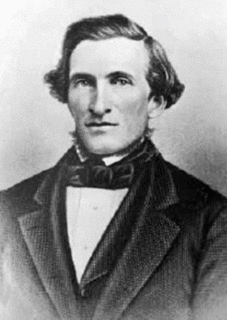A Quote by John Stuart Mill
To discover to the world something which deeply concerns it, and of which it was previously ignorant; to prove to it that it had been mistaken on some vital point of temporal or spiritual interest, is as important a service as a human being can render to his fellow creatures.
Related Quotes
God is not only to be known in His blessed and incomprehensible being, for this is something which is reserved for His saints in the age to come. He is also known from the grandeur and beauty of His creatures, from His providence which governs the world day by day, from His righteousness and from wonders which He shows to His saints in each generation.
For an hour, blended with all she could offer, something noble had been created which had nothing to do with the physical world. And from the turn of his throat, the warmth of his hair, the strong, slender sinews of his hands, something further; which had. Though she combed the earth and searched through the smoke of the galaxies there was no being she wanted but this, who was not and should not be for Philippa Somerville.
...men endeavor to sink us still lower, merely to render us alluring objects for a moment; and women, intoxicated by the adoration which men, under the influence of their senses, pay them, do not seek to obtain a durable interest in their hearts, or to become the friends of the fellow creatures who find amusement in their society.
If he were allowed contact with foreigners he would discover that they are creatures similar to himself and that most of what he has been told about them is lies. The sealed world in which he lives would be broken, and the fear, hatred and self-righteousness on which his morale depends might evaporate.
It is a fearful thing to hate whom God hath loved. To look upon another-his weaknesses, his sins, his faults, his defects is to look upon one who is suffering. He is suffering from negative passions, from the same sinful human corruption from which you yourself suffer. This is very important: do not look upon him with judgmental eyes of comparison, noting the sins you assume you'd never commit. Rather, see him as a fellow sufferer, a fellow human being who is in need of the very healing of which you are in need. Help him, love him, pray for him do unto him as you would have him do unto you.
In the desert you become a discoverer. You discover your soul, which had been submerged in vain pursuits, which had been lost in the coils and toils of modern life. You discover your kinship with nature and man, which is evoked by the naturalness and the gentle humanity of the natives of the desert, and you will also discover God.
The world of men has forgotten the joys of silence, the peace of solitude, which is necessary, to some extent, for the fullness of human living. Man cannot be happy for long unless he is in contact with the springs of spiritual life which are hidden in the depths of his own soul. If man is exiled constantly from his own home, locked out of his spiritual solitude, he ceases to be a true person.
A man that advances in spiritual and in temporal matters at the same time, minding to keep the spiritual first, will not let the temporal lead him; he will not place his heart upon his farm, his horses, or any possession that he has. He will place his desires in heaven, and will anchor his hope in that eternal soil; and his temporal affairs will come up as he advances in the knowledge of God.
One of the most unattractive human traits, and so easy to fall into, is resentment at the sudden shared popularity of a previously private pleasure. Which of us hasn't been annoyed when a band, writer, artist or television series that had been a minority interest of ours has suddenly achieved mainstream popularity? When it was at a cult level we moaned at the philistinism of a world that didn't appreciate it, and now that they do appreciate it we're all resentful and dog-in-the-manger about it.
Perhaps a creature of so much ingenuity and deep memory is almost bound to grow alienated from his world, his fellows, and the objects around him. He suffers from a nostalgia for which there is no remedy upon earth except as it is to be found in the enlightenment of the spirit--some ability to have a perceptive rather than an exploitive relationship with his fellow creatures.
A human being without the proper empathy or feeling is the same as an android built so as to lack it, either by design or mistake. We mean, basically, someone who does not care about the fate which his fellow living creatures fall victim to; he stands detached, a spectator, acting out by his indifference John Donne's theorem that "No man is an island," but giving that theorem a twist: that which is a mental and a moral island is not a man.









































